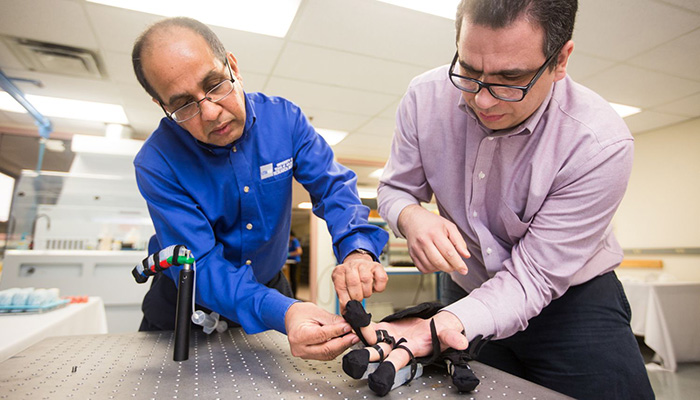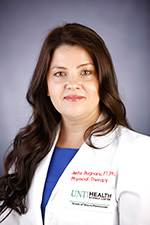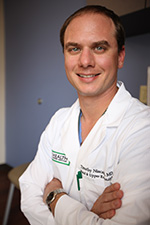Robotic glove may help rehab stroke patients


Initial rehabilitation therapy for many stroke victims may focus on regaining the ability to walk. But when hands also are affected, therapy focused only on the legs can leave hand muscles contracted, a condition that can be difficult to overcome.
A new, soft robotic glove that can open and close a patient’s hand may bring stroke victims relief in a lightweight device that is less expensive and more pliant than current exoskeleton technology. The glove is being developed through the Texas Medical Research Collaborative at the UT Arlington Research Institute in Fort Worth.
A team led by Muthu Wijesundara, UTARI principal research scientist, and UNT Health Science Center researchers Rita Patterson, PhD; Nicoleta Bugnariu, PhD; and Timothy Niacaris, PhD, MD, won a $99,000 grant to move their current prototype into a clinical setting. Development of this device will be conducted at UTARI, while UNTHSC collaborators will evaluate the system’s safety and usability.
“Part of the focus in this development is to create a portable and independent system, capable of applying therapy without the constant supervision of a therapist,” Wijesundara said.

About 800,000 people in the United States have a stroke each year, and up to two-thirds of patients experience impaired hand function, the team wrote in its proposal.
Neurological impairment or severe injury can cause dysfunction in hand motion. Current commercial rehabilitation and assistive devices are based on conventional, rigid robotics, which often incorporate exoskeleton structures. Such devices, however, can be mechanically complex, costly, large and heavy.
By comparison, the soft robotic approach typically utilizes inflatable structures that are less complex, relatively inexpensive and considered a safer option. Yet there are currently no commercial options for soft robotics on the rehabilitation market, researchers said.
“If continuous passive motion devices can be used to apply hand opening and closing motions starting early in the rehabilitation process, it would immensely benefit the standard care of stroke patients and improve their long-term functional abilities and quality of life,” said Dr. Bugnariu, a UNTHSC Associate Professor of Physical Therapy.

UTARI’s soft robotic glove incorporates a hybrid soft-and-rigid pneumatic actuator, a design that offers a low operating pressure, easy fabrication, a lightweight structure and individual control of joints. The flexible nature of this glove allows it to be adapted to various medical conditions and anatomical features.
The system’s technology is based on another UT Arlington invention, the Bubble Actuator, an adaptive interface that fits between a prosthetic device and a patient’s limb to improve fit and comfort.
Mickey McCabe, UTARI executive director, said the project is a wonderful example of UTARI’s drive to develop technologies that can be commercialized in order to improve quality of life.
“In this case, we’re helping patients regain use of their hands and fingers,” said. “This grant from TxMRC brings us one step closer to developing a device that will ultimately improve health and the human condition for the benefit of society.”
***
This story originally appeared on UTA.edu. For more information contact Herb Booth.
Top photo: Muthu Wijesundara, left, and Mahdi Haghshenas-Jaryani, both from UTARI, work on the robotic glove that would help rehabilitate post-stroke patients. The research is being done in collaboration with the UNT Health Science Center. Photo courtesy UT Arlington.



![Uyen Sa Nguyen Scaled[58]](https://www.unthsc.edu/newsroom/wp-content/uploads/sites/16/Uyen-Sa-Nguyen-scaled58-145x175.jpg)

Social media